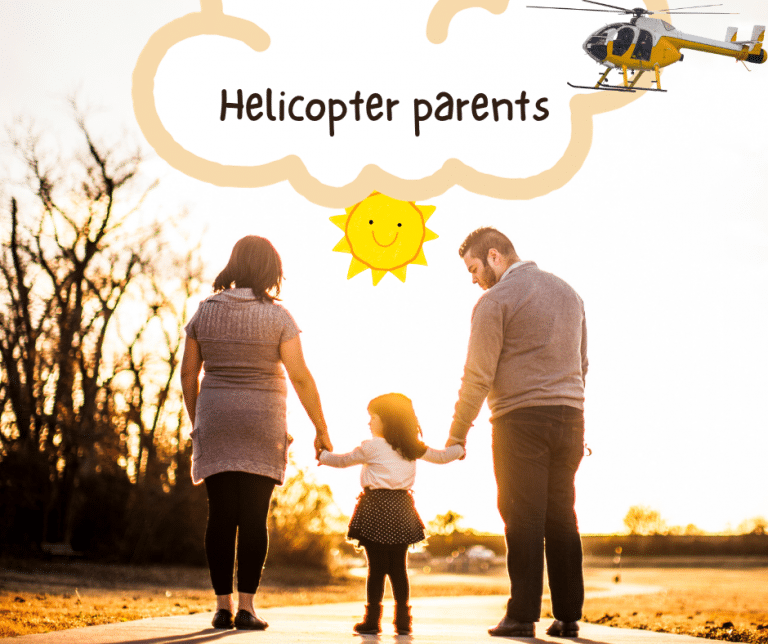Are You a Helicopter Parent?
How Important Is Problem-solving Skill?

Parenting is undeniably a challenging journey. As parents, our natural instinct is to protect our little ones from harm and pain.
However, being too protective can hinder our children’s growth and independence. It’s important to take a step back and evaluate whether we are being overprotective parents, also known as helicopter parenting.
What Is a Helicopter Parent?
A helicopter parent is a term used to describe a parenting style characterized by excessive hovering and overprotective behaviour toward their children. Helicopter parents tend to be overly involved in their children’s lives, making decisions, monitoring their every move, and often shielding them from potential risks or challenges.
For example, parents always follow their children closely, play with them all the time, and do not let them play alone.
When a child forgets an item at school, parents are immediately present to give it to the child to use. When the child quarrels with a friend, parents immediately intervene.
It’s like a helicopter flying around your child all day long!
This parenting style is often well-intentioned, as these parents want the best for their children and aim to ensure their safety and success. However, it can have negative consequences for the child.
What Causes Helicopter Parenting?
Helicopter parenting can develop for many reasons:
• Feelings of anxiety: It’s common for parents to feel worried about their children’s academic progress, safety, and overall well-being.
Given the prevalence of various crimes in both physical and digital spaces, as well as the possibility of an economic downturn leading to job loss, parents may feel the need to exert more control over their children’s lives to keep them safe.
These concerns arise from the complexities of today’s world and a desire to protect their children from potential harm.
• Peer pressure from other parents: Parents often feel pressured to be highly involved in their children’s lives, leading to guilt or inadequacy when they compare themselves to other parents.
• Parents’ experiences in the past: For some parents, their own parents may not have provided them with adequate care and attention, making it challenging for them to cope. As a result, they may feel compelled to compensate by giving their children abundant love and attention. This is often motivated by a profound longing to shield their children from feelings of isolation or disregard.

Common characteristics and behaviours associated with helicopter parents and children
Characteristics associated with being a helicopter parent:
1. Overprotectiveness: Helicopter parents tend to be overprotective and may try to shield their children from discomfort or adversity, hindering their ability to develop resilience.
2. Micromanagement: They closely monitor their child’s activities, including schoolwork, extracurricular activities, and social interactions, often getting involved in the minutiae of their child’s life.
3. Decision-Making: Helicopter parents may make decisions for their children, even when they can make choices independently. This action can stifle the child’s ability to develop decision-making skills.
How do this characteristics affect children:
1. Lack of Independence: Children of helicopter parents may need help with independence and self-reliance, as they are not allowed to learn from their mistakes.
2. Anxiety: The constant hovering and pressure from helicopter parents can lead to anxiety and stress in their children, as they may feel inadequate or pressured to meet their parents’ high expectations.
3. Difficulty with Problem-Solving: Helicopter parenting can hinder a child’s problem-solving abilities, as they are not encouraged to think critically and find solutions independently.
4. Struggles with Failure: Children raised by helicopter parents may fear failure and not know how to cope with setbacks, as they have been shielded from them for much of their lives.
5. Difficulty in Social Relationships: Overly involved parents can sometimes interfere in their child’s friendships and relationships, potentially making it challenging for the child to form healthy social connections.
How to Avoid Helicopter Parenting
How do you balance reasonable care and giving your child enough space for holistic development? Here are five things to help you avoid helicopter parenting:
1.Foster Independence: Allow your children to take on age-appropriate responsibilities and tasks. This will help them make decisions and solve problems independently, even if it means making mistakes.
2. Set Realistic Expectations: Teach your children to cope with setbacks and failures instead of trying to prevent them. Accepting your child’s imperfections is vital to avoiding helicopter parenting.
3. Allow Freedom to Explore: Allow your child to freely discover their interests and hobbies without constant direction or guidance.

4. Teach Problem-Solving Skills: Your child needs to develop critical thinking skills and problem-solving abilities. As a parent, you can provide guidance but avoid giving immediate answers.
5. Reflect and Adapt: As your child grows and develops, it’s important to remain open to adjusting your approach accordingly. In their younger years, your child may require constant supervision to ensure their safety. However, as they mature, they’ll need more space and independence. Observing and adapting to your child’s changing needs and development phase is essential to support their growth effectively.
Parents must be aware of their behaviour and act accordingly to avoid becoming helicopter parents. Each child has a different personality and will need the presence of their parents differently.
Conclusion
Parenting is a continuous journey, and no one is perfect. Helicopter parenting can have negative effects on children, but it often comes from a place of love and concern for their well-being.
Parents naturally want their children to succeed, but excessive worry and fear can hinder their growth and potential. Instead, parents should offer support and guidance without overly supervising their children so that when they face setbacks, they’ll be better equipped to learn from them.
Failure is an opportunity for growth and learning. Creating a balance between support and fostering independence and problem-solving skills is crucial for a child’s healthy development.
Mulberry School Tour
Our Locations
Click here to visit our Contact Us page and view the preschool/infant care centres conveniently located near you.
CONNECT WITH US
USEFUL LINKS
About Us
Mulberry Learning prides itself on making the preschool experience both memorable and enjoyable while transforming a child into a competent explorer, an imaginative thinker, and a creative problem solver. Through our proprietary award-winning curriculum, unique Habits of Mind programme and dedicated staff who are passionate about imparting positive attitudes, Mulberry Learning holds strong in its promise to deliver a holistic education that nurtures the Future Ready Child.
A PREMIUM PRESCHOOL BRAND UNDER GLOBAL EDUHUB


